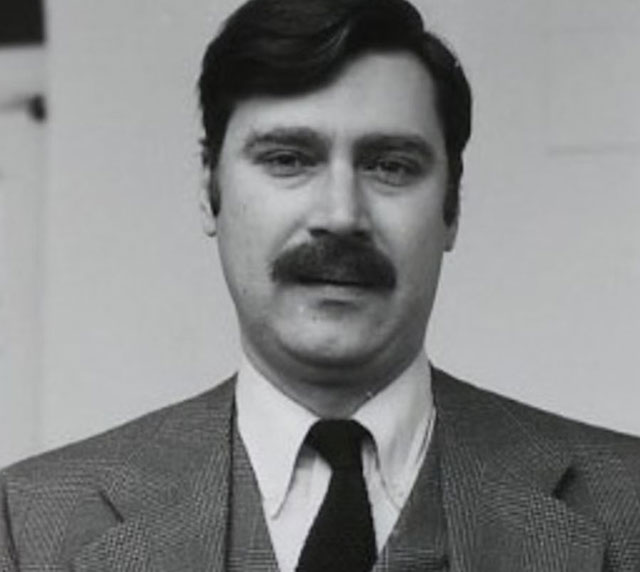by Robert W. Merry
Reflecting on the remarkable life of TAC’s former backpage columnist.
Aram Bakshian Jr. never went to college. Legend has it that he was standing in the registration line at Georgetown University in the fall of 1962 and, struck by the banality of the conversations around him, decided to forgo the university experience and make his way in the world without it. As it happened, he made his way just fine, becoming a significant figure of the American conservative movement for more than a half century as congressional staffer, presidential speechwriter, author, commentator, and Washington raconteur.
Bakshian died September 14 at age 78 from pancreatic cancer. In June, he wrote to friends informing them of the diagnosis and adding, “There is no cure.” He said he planned to continue living and writing as usual for as long as he could. “But I want you to know,” he emphasized, “that I do so in a grateful and contented state of mind.”
Bakshian cut a formidable figure in Washington with his imposing physical stature, meticulously manicured mustache, precision-aimed wit, ever-present cigar, and fondness for specialty European beers, which he consumed copiously without any discernible effect on his mental acuity. A bit idiosyncratic, he never drove a car and walked extensively throughout Northwest Washington, often to the destination of one of his favorite restaurants or bars.
He was just 28 when hired as a speechwriter for President Nixon following the appearance of a New York Times op-ed in which he blasted Republican congressman John Ashbrook’s ill-considered campaign for the 1972 Republican presidential nomination in opposition to Nixon. The Nixon men had never heard of the young conservative upstart. But, appreciating his argument as well as his writing style, they promptly recruited him. After Nixon’s Watergate resignation, Gerald Ford retained him as a speechwriter, and he later joined the Ronald Reagan White House as director of the speechwriting team after a brief stint as an administration liaison official for the arts and humanities.
Reagan’s deputy chief of staff, Michael Deaver, described the speechwriting operation under Bakshian as particularly efficient and effective. Bakshian himself said he managed to avoid problems that could burden his bosses. “The primadonnas were kept under control, and I wasn’t a primadonna,” he told interviewers for an oral history project.
Reagan appreciated Bakshian’s judgment enough to encourage him to speak up whenever he disagreed with the president’s own edits on speech drafts. “It showed a security on his part,” recalled Bakshian later, “also an appreciation of work and knowing that no one person is always going to know all the nuances.”
Bakshian was born on March 11, 1944, in Washington, D.C., to Aram and Ruth Yeatman Bakshian. The father ran the family rug-import business until World War II, then worked as an accountant in the federal government and gravitated to the commercial real estate business. He never quite recovered from the loss of his wife to cancer in 1954, when Aram Jr. was just ten. The senior Aram turned to his sister, Mary, who moved in with the family and ran the household for years. Mary, a lawyer, had served on the Nuremberg tribunals and later worked in the U.S. Treasury Department.
It was a strongly Republican home, and young Aram soon identified himself as a “National Review Republican ” and became active in the Young Republicans organization. After shunning the college experience, he worked as a copy boy at the old Washington Star and served as a public information assistant in the federal government. But his GOP ties soon paved the way for a job in the office of U.S. Representative Bill Brock. Later he became special assistant to Republican National Committee chairman Bob Dole, the Kansas senator. By then he was well-known in Washington as a rising young conservative star.
Following his White House days, Bakshian became editor-in-chief of American Speaker, an enterprise designed to help corporate executives and others master the arts of public speaking. This gave him a lucrative base from which to expand his always prodigious freelance writing. From his earliest adulthood he wrote for publications specializing in his own areas of passion—politics, history, culture, music, even fine dining. There is hardly a major newspaper or popular magazine to which he has not contributed, including all the conservative journals and editorial pages of the past half century, National Review, the American Spectator, the Weekly Standard, and the Wall Street Journal. At his death he was a contributing editor of the National Interest and had served for more than a year, beginning in spring 2018, as TAC’s regular back-page columnist.
These writings displayed Bakshian’s breadth of knowledge, depth of understanding, and dedication to the old verities, along with his famous wit. As writer of a weekly gastronomy column in the Wall Street Journal, he once had occasion to mention the “obese, indulgent” King George IV and his passion for peaches, particularly “stewed in brandy—a condition resembling his own.”
I enjoyed the pleasure of a lifelong friendship with Aram after meeting him in 1975 at the White House Correspondents Association dinner and experiencing the delight of his bonhomie, erudition, and flourishes of expression. Most recently, during my return trips to Washington following my removal to the West Coast, I experienced that delight during long dinner conversations at one of our favorite hangouts, the Cosmos Club.
I called him recently, following his letter to friends about his cancer, and found him to be remarkably upbeat, animated as ever, but just a bit admonitory on what seemed to be the central concern on his mind—that no one should feel sorry for him at the twilight of what he considered a rousing good life.
























































